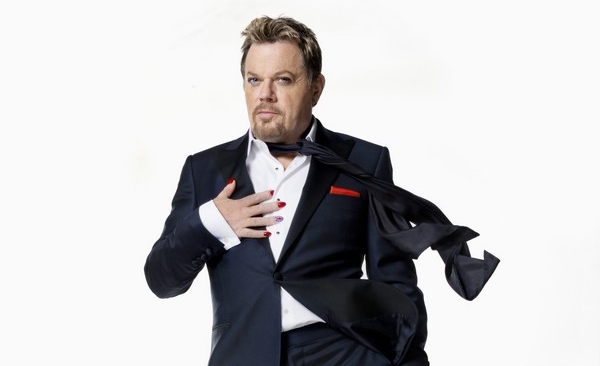“It was unbelievable,” Izzard says. Those familiar with his stand-up material are well-acquainted with the rapid monologues that characterise his sets; the bemused commentary on his own material, the characters that wander in and out like strangers lost in a hotel lobby. “I was in the blackmail sketch, where Mike Palin is hosting. They bring us on with a bag over your head, and Palin says, ‘You’ve been blackmailed!’ But it wasn’t perfectly thought out, you see. You had to just come up with on the spot some reason why somebody would be blackmailing you. But I’d had time to figure out my response, so I said, ‘People have been accusing me of wearing men’s underwear, and it isn’t true!’ That seemed to work. And then, as Eric Idle was pulling me away, I said, ‘Wait, wait, I’ve got another joke!’
“‘What?’ said Eric, ‘You want to say something else?’
“‘Yes,’ I said, ‘I never wanted to be a transvestite. I always wanted to be… a lumberjack!’ It was wonderful, it was very odd, and may well never happen again.”
Izzard these days is quite removed from the 17-year-old refining his comedy in order to impress girls during A-level chemistry classes. He has been touring the world since 1996, after his show Definite Article found great success in the US. 19 years later, Force Majeure is set to arrive in Melbourne next month, and brings with it insights into comedy the multilingual Izzard is in a unique position to relate.
“What I have found is that there is no national sense of humour. No Australian sense of humour, no British or American sense of humour, no German sense of humour – well, of course there’s no German sense of humour,” he concedes. “But there is a mainstream sense of humour in every country, and then there’s a more alternative sense of humour, which is more Python, more like what I do, and that exists all around the world and seems to link up better. The laughs I get when I perform in Russian in Moscow, in German in Berlin, French in Paris, English in Sydney, they all laugh at the same points.”
That everyday surrealism remains a constant in Izzard’s sensibilities. The complexities of his act may have grown (more layered, as he describes it, unlike one of his earliest jokes: “I went fly fishing the other day. I caught three flies”), but absurdity is never far away.
“People used to say, ‘Oh, your comedy is very gentle.’ And I thought, ‘Gentle? God, that doesn’t sound very good.’ So Force Majeure starts with human sacrifice. That seems to avoid the gentle. Whoever thought that killing someone and offering them to a god was a good idea? The gods created everything on Earth, apparently, and if you believe in them, why in the hell would you start killing people? Why be like, ‘Oh yeah, we’re going to kill Jim, because God would love that.’ What? That’s insane! I think that’s where the first fascist guy stepped up. People were wondering, ‘Who should we kill?’ and one guy was like, ‘Let’s kill Jim. I get to choose, because I’ve got a big hat on.’”
Izzard was close to the late Robin Williams, who gave the young comedian his first real break in the US. There is a myth surrounding comedians that has endured so long now that one starts to doubt it is a myth at all – that comedy develops as a survival mechanism; one becomes the tragic clown for fear the girls won’t like you and the boys will beat you up.
“I do think there’s truth in that,” Izzard pauses, and sighs before continuing. “Some people will develop comedy to try and become popular. I definitely did. I wasn’t playing football or soccer, so I used comedy deliberately for that reason. Even Churchill had his ‘black dogs’, but he lived until 90 because he kept powering through. And Robin decided it was just getting too dark. It was tragic. I had no idea. I don’t think it’s necessarily the tragic clown, I just think it’s … Some people have some very dark thoughts, and some of those people end up as comedians.
“But it’s the same everywhere. The tears of a soldier, tears of a politician, tears of a clown. It’s just more dramatic when it’s a comedian because they seem to be having so much fun when they’re onstage, they’re so happy. And with someone like Robin you think, ‘God, if only you could just go back onstage and keep living in that fun time,’ you know? But it just doesn’t seem to work that way. It’s the cards you get given at birth, and how you end up playing them in life.”
BY ADAM NORRIS

